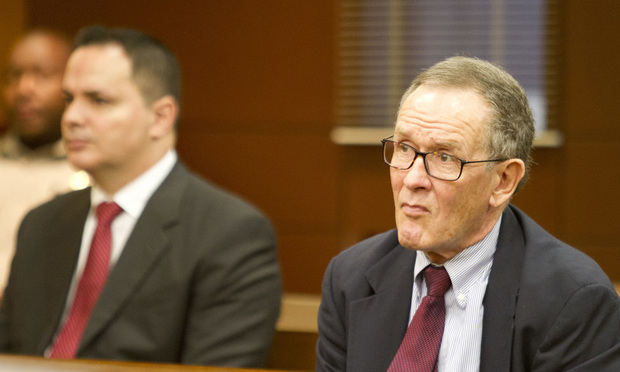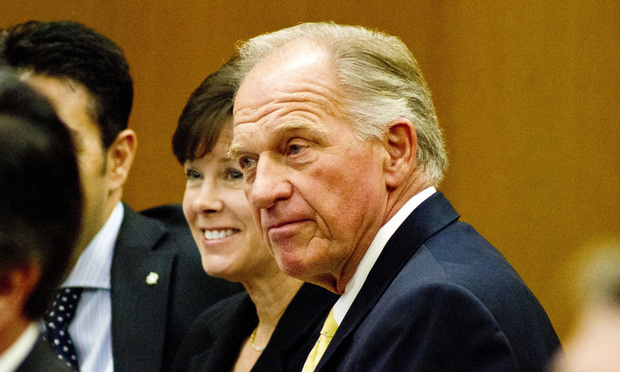A Year in Review: A Waffle House Sex Tape Scandal, Alston & Bird's LegalMal Fight & Ford's Testy Trial
Part two of our review takes a look at some of the contentious trials that heated up Georgia courtrooms in 2018.
December 27, 2018 at 01:55 PM
8 minute read
 L-R: David Cohen and John Butters. Photo: John Disney/ALM.
L-R: David Cohen and John Butters. Photo: John Disney/ALM.
What a year it was for big trials in Georgia. Alston & Bird, Ford and even a Waffle House executive all drew leading roles in some of the state's biggest litigation.
Two lawyers—along with their client—were acquitted of extortion charges for their role in recording a sexual encounter between a well-heeled Waffle House executive and his former housekeeper.
A legal malpractice case against venerable legal powerhouse Alston & Bird and one of its longtime senior partners ended with a plaintiff's victory that nonetheless left the victors unsatisfied.
And a case in which no lawyer was actually on trial spawned acrimonious allegations of misconduct by both sides, and ultimately ended in a mistrial and a tough sanctions order against defendant Ford Motor Co.
 Fran and Joseph Rogers Jr. (Photo: John Disney/ALM)
Fran and Joseph Rogers Jr. (Photo: John Disney/ALM)Waffle House and Sex Tapes
Some of the state's best-known criminal defense lawyers won the acquittal of a former Cobb County prosecutor, an Atlanta attorney, and the former housekeeper of Waffle House's board chairman in a long-running tangle of civil and criminal litigation over a secret sex tape.
The defendants—former Cobb County Assistant District Attorney John Butters, Atlanta lawyer David Cohen, and client Mye Brindle—were acquitted in April of felony charges that they violated state eavesdropping laws when making the tape. In 2012, Brindle, the longtime housekeeper for Joe Rogers Jr., secretly recorded herself sexually servicing the Waffle House executive in the bedroom of his home after retaining Cohen and Butters.
The criminal charges stemmed from a demand letter Cohen sent to Rogers outlining the housekeeper's sexual harassment claims after Brindle made the tape. After Brindle's lawyers demanded $12 million, Rogers sued Brindle and, later, complained to Fulton County District Attorney Paul Howard. Brindle responded with a suit of her own that was dismissed. She also filed a counterclaim in Rogers' suit.
➤➤A Year in Review: The Fall of Attorneys Tex McIver and Nathan Hardwick
After six years and multiple appeals, Rogers' suit against Brindle and her counterclaim against him finally appear headed toward a civil trial. Butters and Cohen have been disqualified from representing Brindle. The two attorneys are also defendants in another civil suit brought by Rogers over their role in making the sex tape. That case is currently before the state Court of Appeals.
The criminal trial led to the public airing of the sex tape, and included testimony from both Rogers and Brindle.
Rogers insisted the liaison was consensual, but his testimony that he “never pursued anyone in an unwanted fashion” opened the door for defense lawyer Brian Steel to cross-examine Rogers—and call witnesses—regarding previous sexual harassment allegations from women going back nearly two decades.
In doing so, the defense dramatically shifted the focus of the trial from whether Butters, Cohen and Brindle violated the state's eavesdropping law to whether Rogers was a serial harasser of women working for him.
The trial took place as the #MeToo movement focused a national spotlight on sexual harassment by powerful men in media, government, business and the judiciary.
Brindle's occasionally tearful testimony lined up with other victims across the nation who said they feared losing a good job if they didn't comply with their boss' unwanted attention.
A jury question over whether a video recording only requires the consent of one party—and the judge's decision to give jurors a copy of the state law but not a state Supreme Court ruling on that question that paved the way for the trial—prompted a rare emergency appeal by the district attorney as the jury deliberated. But the jury acquitted the defendants before the appellate court could rule, effectively ending the appeal.
 Former Alston & Bird attorney Jack Sawyer testifies in Fulton County Superior Court. Photo: John Disney/ALM.
Former Alston & Bird attorney Jack Sawyer testifies in Fulton County Superior Court. Photo: John Disney/ALM.Alston & Bird's Malpractice Trial
Despite a $2 million jury verdict against Alston & Bird in February, the firm's lawyers left smiling because the lion's share of the award—which included more than $1 million in attorney fees—was apportioned to a third party who, while on the jury form, was not a defendant.
The plaintiffs had asked for at least $3.5 million in damages and fees as well as punitive damages, which the jury declined to award. Their appeal of the trial court's apportioned judgment is pending.
The case involved a family-owned company, Hatcher Management Holdings LLC, and Alston & Bird partner Jack Sawyer, who helped set it up and advise the company's managing partner and eldest sibling, Maury Hatcher.
Maury Hatcher cashed out his interests in 2009, paying himself hundreds of thousands of dollars before leaving the state.
His brothers, Jerry and Barry Hatcher, took over the company and sued Maury, obtaining a $4 million default judgment that was never paid. In 2013 they and the company sued Alston & Bird, arguing that Sawyer knew about Maury's plans and helped him arrange the cushy departure.
During a two-week trial before Fulton County Superior Court Judge Craig Schwall, the plaintiffs were represented by Harmon Caldwell Jr., Harry MacDougald, Jeremy Moeser and Christine Dial of Caldwell, Propst & DeLoach.
Alston & Bird's team included Richard Robbins, Jason Alloy and Jeremy Littlefield of Robbins Ross Alloy Belinfante Littlefield.
The jury awarded compensatory damages and interest of more than $1 million and added $1,096,561 in attorney fees after finding Alston & Bird engaged in bad faith,
But the panel said nondefendant Maury Hatcher, who did not appear at trial, was liable for 60 percent of the award, and Alston & Bird responsible only for 32 percent. The other 8 percent was apportioned to the company.
Maury Hatcher's lawyers argued that only the damages should be apportioned, but Schwall ultimately reduced the entire award by 68 percent, leaving the judgment at $683,522.
 Gwinnett County State Court Judge Shawn Bratton (Photo: John Disney/ALM)
Gwinnett County State Court Judge Shawn Bratton (Photo: John Disney/ALM)Ford on Trial
One of the most contentious civil trials of the year—maybe any year—isn't really over.
The lawyers started fighting on the first day of voir dire, and continue still. The story includes a mistrial, severe sanctions, an appeal of those sanctions, and teams of lawyers lined up to fight again.
The product liability wrongful death lawsuit was filed by the sons of Georgia farmers Melvin and Voncile Hill, who died in a rollover crash in their F-250 Super Duty pickup truck. Their sons, Kim and Adam, alleged their parents were killed by a faulty roof.
Ford defended its roof and shifted the blame to a defective tire and proper doses of prescription medicine taken by Melvin Hill, a teetotaling Baptist on his way to pick up a part to fix their tractor.
The Hills' lead counsel, Jim Butler, accused Ford's lawyers of trying to make Melvin Hill out to be “some kind of pill head.” Ford's lawyers accused the sons of destroying evidence by having their parents autopsied for a cause of death. Ford's lead trial counsel is D. Alan Thomas of Huie Fernambucq & Stewart in Birmingham, Alabama.
Gwinnett County State Court Judge Shawn Bratton declared a mistrial in April, after three weeks of trial proceedings in which both sides said their cases were damaged beyond repair. In the judge's own words, it was a trial in which every question brought an objection, and every objection brought another one from the other side.
After the trial crashed, the judge punished Ford by taking away most of its defense in the next round—a sanction Ford called a civil death penalty. Ford tried—unsuccessfully—to have Bratton removed from the case. Then, before the judge could schedule a new trial, Ford appealed Bratton's sanctions.
The case is now on hold pending action from the Georgia Court of Appeals.
This content has been archived. It is available through our partners, LexisNexis® and Bloomberg Law.
To view this content, please continue to their sites.
Not a Lexis Subscriber?
Subscribe Now
Not a Bloomberg Law Subscriber?
Subscribe Now
NOT FOR REPRINT
© 2025 ALM Global, LLC, All Rights Reserved. Request academic re-use from www.copyright.com. All other uses, submit a request to [email protected]. For more information visit Asset & Logo Licensing.
You Might Like
View All
40% Contingency: A New Ruling Just Cost This Plaintiff Team $827K in Legal Fees
6 minute read
'David and Goliath' Dispute Between Software Developers Ends in $24M Settlement

Trending Stories
- 1Litigators of the Week: A Knockout Blow to Latest FCC Net Neutrality Rules After ‘Loper Bright’
- 2Litigator of the Week Runners-Up and Shout-Outs
- 3Norton Rose Sues South Africa Government Over Ethnicity Score System
- 4KMPG Wants to Provide Legal Services in the US. Now All Eyes Are on Their Big Four Peers
- 5Friday Newspaper
Who Got The Work
Michael G. Bongiorno, Andrew Scott Dulberg and Elizabeth E. Driscoll from Wilmer Cutler Pickering Hale and Dorr have stepped in to represent Symbotic Inc., an A.I.-enabled technology platform that focuses on increasing supply chain efficiency, and other defendants in a pending shareholder derivative lawsuit. The case, filed Oct. 2 in Massachusetts District Court by the Brown Law Firm on behalf of Stephen Austen, accuses certain officers and directors of misleading investors in regard to Symbotic's potential for margin growth by failing to disclose that the company was not equipped to timely deploy its systems or manage expenses through project delays. The case, assigned to U.S. District Judge Nathaniel M. Gorton, is 1:24-cv-12522, Austen v. Cohen et al.
Who Got The Work
Edmund Polubinski and Marie Killmond of Davis Polk & Wardwell have entered appearances for data platform software development company MongoDB and other defendants in a pending shareholder derivative lawsuit. The action, filed Oct. 7 in New York Southern District Court by the Brown Law Firm, accuses the company's directors and/or officers of falsely expressing confidence in the company’s restructuring of its sales incentive plan and downplaying the severity of decreases in its upfront commitments. The case is 1:24-cv-07594, Roy v. Ittycheria et al.
Who Got The Work
Amy O. Bruchs and Kurt F. Ellison of Michael Best & Friedrich have entered appearances for Epic Systems Corp. in a pending employment discrimination lawsuit. The suit was filed Sept. 7 in Wisconsin Western District Court by Levine Eisberner LLC and Siri & Glimstad on behalf of a project manager who claims that he was wrongfully terminated after applying for a religious exemption to the defendant's COVID-19 vaccine mandate. The case, assigned to U.S. Magistrate Judge Anita Marie Boor, is 3:24-cv-00630, Secker, Nathan v. Epic Systems Corporation.
Who Got The Work
David X. Sullivan, Thomas J. Finn and Gregory A. Hall from McCarter & English have entered appearances for Sunrun Installation Services in a pending civil rights lawsuit. The complaint was filed Sept. 4 in Connecticut District Court by attorney Robert M. Berke on behalf of former employee George Edward Steins, who was arrested and charged with employing an unregistered home improvement salesperson. The complaint alleges that had Sunrun informed the Connecticut Department of Consumer Protection that the plaintiff's employment had ended in 2017 and that he no longer held Sunrun's home improvement contractor license, he would not have been hit with charges, which were dismissed in May 2024. The case, assigned to U.S. District Judge Jeffrey A. Meyer, is 3:24-cv-01423, Steins v. Sunrun, Inc. et al.
Who Got The Work
Greenberg Traurig shareholder Joshua L. Raskin has entered an appearance for boohoo.com UK Ltd. in a pending patent infringement lawsuit. The suit, filed Sept. 3 in Texas Eastern District Court by Rozier Hardt McDonough on behalf of Alto Dynamics, asserts five patents related to an online shopping platform. The case, assigned to U.S. District Judge Rodney Gilstrap, is 2:24-cv-00719, Alto Dynamics, LLC v. boohoo.com UK Limited.
Featured Firms
Law Offices of Gary Martin Hays & Associates, P.C.
(470) 294-1674
Law Offices of Mark E. Salomone
(857) 444-6468
Smith & Hassler
(713) 739-1250







